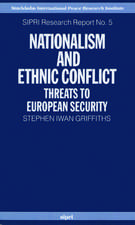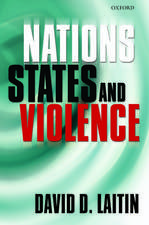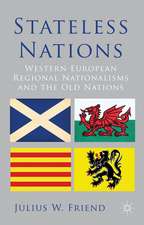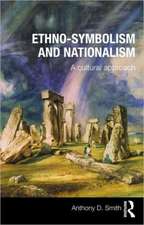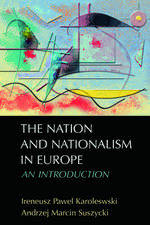Waves of War: Nationalism, State Formation, and Ethnic Exclusion in the Modern World: Cambridge Studies in Comparative Politics
Autor Andreas Wimmeren Limba Engleză Paperback – 21 noi 2012
| Toate formatele și edițiile | Preț | Express |
|---|---|---|
| Paperback (1) | 242.38 lei 43-57 zile | |
| Cambridge University Press – 21 noi 2012 | 242.38 lei 43-57 zile | |
| Hardback (1) | 643.70 lei 43-57 zile | |
| Cambridge University Press – 21 noi 2012 | 643.70 lei 43-57 zile |
Din seria Cambridge Studies in Comparative Politics
-
 Preț: 179.15 lei
Preț: 179.15 lei -
 Preț: 267.61 lei
Preț: 267.61 lei -
 Preț: 239.36 lei
Preț: 239.36 lei - 9%
 Preț: 594.67 lei
Preț: 594.67 lei -
 Preț: 160.82 lei
Preț: 160.82 lei -
 Preț: 269.58 lei
Preț: 269.58 lei -
 Preț: 264.74 lei
Preț: 264.74 lei -
 Preț: 177.28 lei
Preț: 177.28 lei -
 Preț: 225.70 lei
Preț: 225.70 lei -
 Preț: 164.94 lei
Preț: 164.94 lei -
 Preț: 236.42 lei
Preț: 236.42 lei -
 Preț: 185.64 lei
Preț: 185.64 lei -
 Preț: 233.13 lei
Preț: 233.13 lei -
 Preț: 206.71 lei
Preț: 206.71 lei -
 Preț: 231.82 lei
Preț: 231.82 lei -
 Preț: 206.52 lei
Preț: 206.52 lei -
 Preț: 201.24 lei
Preț: 201.24 lei -
 Preț: 358.37 lei
Preț: 358.37 lei -
 Preț: 203.42 lei
Preț: 203.42 lei -
 Preț: 232.45 lei
Preț: 232.45 lei -
 Preț: 257.82 lei
Preț: 257.82 lei -
 Preț: 191.12 lei
Preț: 191.12 lei -
 Preț: 158.77 lei
Preț: 158.77 lei -
 Preț: 199.05 lei
Preț: 199.05 lei - 11%
 Preț: 553.80 lei
Preț: 553.80 lei - 11%
 Preț: 695.06 lei
Preț: 695.06 lei -
 Preț: 288.80 lei
Preț: 288.80 lei -
 Preț: 262.06 lei
Preț: 262.06 lei - 11%
 Preț: 691.66 lei
Preț: 691.66 lei -
 Preț: 388.29 lei
Preț: 388.29 lei -
 Preț: 288.04 lei
Preț: 288.04 lei -
 Preț: 228.00 lei
Preț: 228.00 lei -
 Preț: 385.28 lei
Preț: 385.28 lei -
 Preț: 312.89 lei
Preț: 312.89 lei -
 Preț: 224.44 lei
Preț: 224.44 lei -
 Preț: 287.07 lei
Preț: 287.07 lei -
 Preț: 251.27 lei
Preț: 251.27 lei -
 Preț: 313.70 lei
Preț: 313.70 lei -
 Preț: 277.38 lei
Preț: 277.38 lei -
 Preț: 423.79 lei
Preț: 423.79 lei - 11%
 Preț: 552.94 lei
Preț: 552.94 lei - 11%
 Preț: 554.43 lei
Preț: 554.43 lei - 14%
 Preț: 783.26 lei
Preț: 783.26 lei
Preț: 242.38 lei
Nou
Puncte Express: 364
Preț estimativ în valută:
46.38€ • 48.55$ • 38.60£
46.38€ • 48.55$ • 38.60£
Carte tipărită la comandă
Livrare economică 31 martie-14 aprilie
Preluare comenzi: 021 569.72.76
Specificații
ISBN-13: 9781107673243
ISBN-10: 1107673240
Pagini: 346
Ilustrații: 17 b/w illus. 35 tables
Dimensiuni: 151 x 228 x 16 mm
Greutate: 0.54 kg
Editura: Cambridge University Press
Colecția Cambridge University Press
Seria Cambridge Studies in Comparative Politics
Locul publicării:New York, United States
ISBN-10: 1107673240
Pagini: 346
Ilustrații: 17 b/w illus. 35 tables
Dimensiuni: 151 x 228 x 16 mm
Greutate: 0.54 kg
Editura: Cambridge University Press
Colecția Cambridge University Press
Seria Cambridge Studies in Comparative Politics
Locul publicării:New York, United States
Cuprins
1. Introduction and summary; 2. The birth of the nation; 3. The global rise of the nation-state; 4. Nation-state formation and war; 5. Ethnic politics and armed conflict; 6. Can peace be engineered?; 7. Conclusion; Appendices.
Recenzii
'For all their usefulness, quantitative studies of conflict often suffer from theoretical shallowness and historical myopia. Andreas Wimmer complements his quantitative study of global conflict with a deep theoretical understanding of nationalism and ethnicity. He then embeds it into a powerful historical account of the rise and spread of the nation-state during the past two centuries. Waves of War is a critical and timely contribution to the study of conflict that sets a new standard.' Stathis N. Kalyvas, Yale University
'Combining the broad landscapes of comparative macro sociology (in the tradition of Stein Rokkan) with data-filled attention to the micro processes of nation formation (in the tradition of Karl Deutsch), Andreas Wimmer paints an original and compelling picture of the historical development of the nation-state and the relationship of state-building to contemporary violence.' David D. Laitin, Watkins Professor of Political Science, Stanford University
'Andreas Wimmer's Waves of War uses quantitative comparative-historical analysis with stunning success to address some of the biggest questions of macrosociology: the creation of large-scale ethnic communities, the birth of the nation-state, and the role of warfare in the creation of the modern political world.' James Mahoney, Northwestern University
'Beginning in the nineteenth century, cycles of violent upheaval and world war collapsed empires and dynastic kingdoms, while the nation-state spread to every corner of the globe. This ambitious book provides one of the best accounts yet of this grand transformation of the global political order, driven by the explosive appeal of nationalism and self-rule … Wimmer's major contribution is to demonstrate how the spread of the nation-state generated violence and war. Marshaling carefully assembled quantitative evidence, [he] shows that the incidence of war more than doubled once nationalism gained a foothold in world politics and triggered violent struggles over borders, ethnicity, and self-determination.' Foreign Affairs
'Combining the broad landscapes of comparative macro sociology (in the tradition of Stein Rokkan) with data-filled attention to the micro processes of nation formation (in the tradition of Karl Deutsch), Andreas Wimmer paints an original and compelling picture of the historical development of the nation-state and the relationship of state-building to contemporary violence.' David D. Laitin, Watkins Professor of Political Science, Stanford University
'Andreas Wimmer's Waves of War uses quantitative comparative-historical analysis with stunning success to address some of the biggest questions of macrosociology: the creation of large-scale ethnic communities, the birth of the nation-state, and the role of warfare in the creation of the modern political world.' James Mahoney, Northwestern University
'Beginning in the nineteenth century, cycles of violent upheaval and world war collapsed empires and dynastic kingdoms, while the nation-state spread to every corner of the globe. This ambitious book provides one of the best accounts yet of this grand transformation of the global political order, driven by the explosive appeal of nationalism and self-rule … Wimmer's major contribution is to demonstrate how the spread of the nation-state generated violence and war. Marshaling carefully assembled quantitative evidence, [he] shows that the incidence of war more than doubled once nationalism gained a foothold in world politics and triggered violent struggles over borders, ethnicity, and self-determination.' Foreign Affairs
Notă biografică
Descriere
A new perspective on how the nation-state emerged and subsequently proliferated across the globe, accompanied by a wave of wars.

